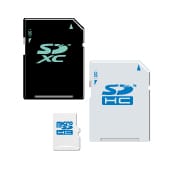Annual SD Express Student Project Competition
The annual competition attracts innovative student participants from prestigious universities from around the world.
Students used a microSD Express memory card as the main storage device, operating on an Nvidia Jetson Orin Nano Development board.
- Highlights one or more advantages of using microSD Express technology supported by quantitative analysis (40%)
- Incorporation of new technologies like AI/ML, AR/VR, robotics, gaming, etc. directed at new potential consumer markets or other mass market products for SD cards (20%)
- Functioning project that can be demonstrated (10%)
- Scientific value and impact (10%)
- Creativity and originality (10%)
- Clarity of submission (10%)
Summarized Project Submissions – 2025
Total of 21 students from six prestigious universities joined the program in 2025. Following are short summaries of the 14 projects that reached the finish line and submitted to the SDA in September 2025. Download to read full project abstracts. Read analysis from the judging panel about the competition.
First Place
Remote PPG-based Vital Signs Monitoring
Shira Barmats and Shakedd Levi
Supervisor: Yair Moshe
Technion – Israel Institute of Technology
Summary: A dual-mode system for contactless vital-sign monitoring from 1440p facial video using remote photoplethysmography (rPPG). Running on an NVIDIA Jetson Orin Nano Super Developer Kit, our prototype records the uncompressed stream to a microSD Express card while simultaneously executing a downscaled, low-latency pipeline for live feedback.
Second Place
EmberEye – System for Real-Time Detection of Wildfires
Itay Hovav and Roy Cohen
Supervisor: Harel Yadid
Technion – Israel Institute of Technology
Summary: Due to climate change, the world continues to experience wildfires that are often not detected in time. Many existing solutions are bulky, expensive, or impractical, leaving us with the growing problem of small, manageable fires turning into large-scale disasters. Running AI models on edge devices requires computational efficiency and fast, sustained read/write performance supported by microSD Express memory cards capable of handling video streams and logging in real-time.
Third Place
AI-Powered Edge Storage for Smart Cameras Using microSD Express
Toward Smarter, Safer Crosswalks
Michael Patrini
Supervisor: Prof. Stefano Bregni
Politecnico di Milano
Summary: Urban mobility presents significant challenges for visually impaired people, particularly when crossing signalized pedestrian intersections. The system provides real-time voice feedback to the user, announcing the traffic light status and the proximity to crosswalks, without requiring manual interaction. In parallel, a separate benchmarking campaign compared SD Express, microSDXC1, and M.2 SSD2 devices to evaluate storage performance and energy efficiency in edge AI workloads.
Submissions
Adaptive Path Learning and Optimization for Autonomous Racing
Cheung Yi Hing, Lok Yin Fung and Law Chi Chung
Supervisor: Prof. Woo Kam Tim
Hong Kong University of Science and Technology
Summary: This project proposes an adaptive driving system for autonomous miniature race cars, focusing on real-time performance optimization through first-lap mapping, enabled by SD Express technology. The system first trains a base model using behavioral cloning from data logged during remote-controlled driving from professional driver; the microSD Express card’s high write speed is essential for capturing the high-frequency image and control data required.
AI Instant Photo Booth
Cheung King Sum
Supervisor: Prof. Woo Kam Tim
Hong Kong University of Science and Technology
Summary: This project shows the creation of a portable photo booth that offers convenient and interactive drawing experiences. Inspired by traditional photo booths, the aim is to design a portable system with AI enhancement. The system integrates a webcam for image capture, microSD Express for high-speed storage and retrieval, and Jetson Nano Orin as the AI processing module.
EcoGuard
Chueng Man Ching
Supervisor: Prof. Woo Kam Tim
Hong Kong University of Science and Technology
Summary: EcoGuard is a modular edge AI system designed for real-time wildlife sound monitoring and anti-poaching and it leverages the high-speed capabilities of microSD Express memory cards to enable flexible, species-targeted conservation efforts. The system adopts a unique “one card, one species” architecture, where each microSD Express card stores a pre-trained AI model for detecting specific species, such as birds and amphibians, alongside a mandatory anti-poaching module to identify threats like gunshots or chainsaws.
Synthetic Data Generation for Enhanced Robot Manipulation Performance
Lo Hiu Ching and Huang Haolun
Supervisor: Prof. Woo Kam Tim
Hong Kong University of Science and Technology
Summary: This project investigates a synthetic-data-driven pipeline to enhance robot manipulation for automated recycling. A microSD Express card serves as the unified high-speed storage layer for large synthetic datasets and serialized model artifacts, enabling rapid iteration and reliable field deployment with minimal cabling.
Localization with LIDAR (Robotics Related Project)
Siu Ming Fung, Wu Haoran, Ho Chun Ying
Supervisor: Prof. Woo Kam Tim
Hong Kong University of Science and Technology
Summary: This project develops an autonomous indoor navigation system using the NVIDIA Jetson Nano Super, leveraging LiDAR-based simultaneous localization and mapping (SLAM) for precise localization in complex environments. The system integrates a low-cost LIDAR sensor to generate 3D maps and localize the robot, with data stored on a high-speed microSD Express card for efficient processing.
AquaTech SDX: High-Speed Underwater Robotics with microSD Express
by Wong Chin Ching. Supervisor: Prof. Woo Kam Tim
Hong Kong University of Science and Technology
Summary: The advancement of marine robotics has created unprecedented opportunities in scientific research, industrial inspection, and environmental conservation. These missions demand the continuous collection of high-quality video and sensor data. The AquaTech SDX project, developed on the HKUST Robotics Team’s AquaTech platform, addresses this bottleneck by exploring the adoption of microSD Express memory cards. Built upon PCIe/NVMe architecture, microSD Express technology provides sequential write speeds of ~880–890 MB/s and significantly reduced access latency.
CopenCluster – An advanced Video Streaming/Recognition & Telemetry-Focused Digital Car Dashboard
Alessandro Marchioro
Supervisor: Prof. Stefano Bregni
Politecnico di Milano
Summary: The CopenCluster project started at the beginning of 2025 from the idea of developing a sort of resto-mod of a car of mine, a Daihatsu Copen. The initial conception was to build a 1:1 replica of the original car analogic cluster, reinterpreted digitally, in order to make it seem more futuristic and rely on a microSD Express memory card for storage.
Smart Lecture Companion
Andrea Torti
Supervisor: Prof. Stefano Bregni
Politecnico di Milano
Summary: The Smart Lecture Companion transforms passive learning materials—video lectures and PDF slides—into an interactive, searchable knowledge base via a Retrieval-Augmented Generation (RAG) pipeline on an NVIDIA Jetson Orin. This submission highlights the critical role of a microSD Express card in enabling high-performance AI/ML operations on an embedded platform.
Watch Over – System for Elderly Persons at Home
Jenan Nassar and Reem Dallasheh
Supervisor: Harel Yadid
Technion – Israel Institute of Technology
Summary: Falls are among the leading causes of injury for elderly individuals living alone, often resulting in severe medical complications if not addressed promptly. This project introduces a cost-effective, real-time fall detection system built on the NVIDIA Jetson Orin Nano platform, utilizing a standard camera alongside a high-speed microSD Express memory card for storage and buffering.
EdgeWear
Seo Bin Han and Luuanne Chau
Supervisor: Zhaodan Kong, PhD
University of California Davis
Summary: The global wearable technology market is rapidly expanding with consumers increased health awareness and the demand for personalized, preventive care. Current wearable devices provide activity tracking and basic biometrics but lack edge-computing solutions that can detect fatigue and intervene in real time. EdgeWear, introduces multimodal fatigue prevention wearable built around electromyography (EMG) with inertial measurement unit (IMU) sensing, with future integration of ECG. Leveraging a microSD Express memory card for high-speed, lossless logging, EdgeWear enables real-time analysis and actionable feedback.
Isolated Low-Current Measurement & microSD Express Data
Logging on Jetson Orin Nano
Irwin Lopez and Vinny Fang
Supervisor: Eric Prebys
University of California Davis
Summary: We explore how a Jetson Orin Nano–based measurement stack can digitize ultra-low currents while logging directly to a microSD Express memory card. Building on a logarithmic-amplifier front end with galvanic isolation, we route the conditioned signal into the host for digital readout and apply 16-bit SPI digital potentiometers to trim gain and offset without rework. Results indicate that SD Express technology provides a compact, removable, high-throughput store for long captures in embedded test systems, while the isolated log-amp chain preserves fidelity across decades of current.



